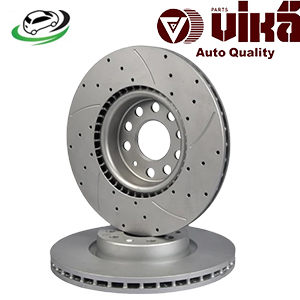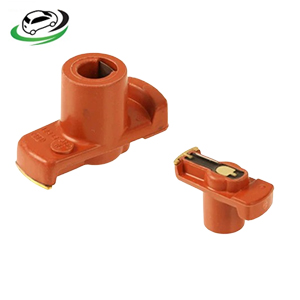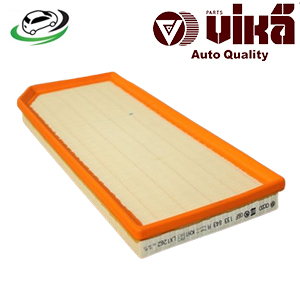-16%
Get Air Filter Element Sub Assy AUDI A3 8P/TT MKII / VW EOS/Golf V/Jetta V/Passat B6 06F133843A
The air filter in a vehicle’s engine plays a crucial role in maintaining the engine’s performance, efficiency, and longevity. It is a relatively small and inexpensive component, but its importance cannot be overstated. Here’s a comprehensive overview of the air filter, covering its function, types, maintenance, and benefits.
Function of the Air Filter
The primary function of the air filter is to clean the air entering the engine. An internal combustion engine requires a precise mixture of air and fuel to operate efficiently. The air filter traps dust, dirt, debris, and other contaminants, preventing them from entering the engine. Clean air is essential for proper combustion, optimal engine performance, and minimizing wear on engine components.
Types of Air Filters
There are several types of air filters, each with its own advantages and applications. The main types are:
- Paper Air Filters:
- Material: Made from pleated paper or synthetic material.
- Pros: Cost-effective, efficient at trapping particles, widely available.
- Cons: Disposable, needs frequent replacement, not suitable for extreme environments.
- Foam Air Filters:
- Material: Made from a foam material.
- Pros: Reusable, can be cleaned and re-oiled, excellent for off-road and dusty conditions.
- Cons: May not filter as finely as paper filters, requires maintenance.
- Cotton Gauze Air Filters:
- Material: Made from multiple layers of cotton gauze.
- Pros: Reusable, high airflow, good filtration, long lifespan.
- Cons: More expensive, requires regular cleaning and oiling.
- Carbon Air Filters:
- Material: Incorporates activated carbon.
- Pros: Excellent at removing odors and gases, good filtration.
- Cons: More expensive, typically used in cabin air filters rather than engine air filters.
- Synthetic Air Filters:
- Material: Made from synthetic fibers.
- Pros: High durability, good filtration, can be reused.
- Cons: Higher cost, may require specific maintenance.
Importance of the Air Filter
A properly functioning air filter is vital for several reasons:
- Engine Performance: A clean air filter ensures that the engine receives the right amount of clean air, which is essential for optimal combustion. This helps maintain engine power and acceleration.
- Fuel Efficiency: An efficient air filter can improve fuel economy. A clogged or dirty filter restricts airflow, causing the engine to work harder and consume more fuel.
- Engine Longevity: By trapping harmful particles, the air filter prevents them from entering the engine, reducing wear and tear on components such as pistons, cylinders, and valves.
- Emissions Control: A clean air filter helps the engine run more efficiently, reducing harmful emissions and contributing to a cleaner environment.
- Protection of Engine Components: Dust and debris can cause significant damage to the engine if not filtered out. The air filter acts as the first line of defense, protecting sensitive engine parts.
Maintenance of the Air Filter
Regular maintenance of the air filter is crucial to ensure it functions effectively. Here are some key points regarding air filter maintenance:
- Inspection: Regularly inspect the air filter for signs of dirt, dust, and debris. Most manufacturers recommend checking the air filter every 12,000 to 15,000 miles, but this can vary based on driving conditions.
- Replacement: Depending on the type of air filter, replacement intervals will vary. Paper filters are typically replaced every 12,000 to 15,000 miles, while reusable filters like foam or cotton gauze can last much longer with proper maintenance.
- Cleaning Reusable Filters: For reusable air filters, follow the manufacturer’s instructions for cleaning and re-oiling. Generally, this involves washing the filter with a special cleaner, rinsing it thoroughly, allowing it to dry, and then applying the appropriate oil.
- Driving Conditions: If you frequently drive in dusty or off-road conditions, the air filter will require more frequent inspection and maintenance. Harsh environments can quickly clog the filter, reducing its effectiveness.
Benefits of a Clean Air Filter
Maintaining a clean air filter provides numerous benefits:
- Improved Engine Performance: With a clean air filter, the engine receives an adequate supply of clean air, enhancing performance and responsiveness.
- Better Fuel Efficiency: A clean air filter reduces the workload on the engine, leading to better fuel efficiency and lower fuel costs.
- Reduced Emissions: Efficient combustion resulting from a clean air filter helps reduce harmful emissions, contributing to a cleaner environment.
- Extended Engine Life: By preventing contaminants from entering the engine, a clean air filter helps extend the life of engine components, reducing the likelihood of costly repairs.
- Enhanced Driving Experience: A well-maintained air filter contributes to a smoother and more enjoyable driving experience, with better acceleration and overall engine performance.
Signs of a Clogged Air Filter
Recognizing the signs of a clogged or dirty air filter can help you address the issue before it leads to more significant problems. Common signs include:
- Reduced Fuel Efficiency: A sudden drop in fuel economy may indicate a clogged air filter restricting airflow.
- Poor Engine Performance: Hesitation, misfires, or sluggish acceleration can be symptoms of a dirty air filter.
- Unusual Engine Noises: A clogged air filter can cause unusual noises such as coughing, popping, or backfiring from the engine.
- Black Smoke from Exhaust: An excessively dirty air filter can lead to incomplete combustion, resulting in black smoke coming from the exhaust pipe.
- Check Engine Light: In some cases, a clogged air filter can trigger the check engine light due to its impact on the engine’s air-fuel mixture and overall performance.
Follow us on Facebook for more parts.





